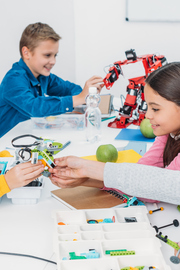How Stem Learning Can Boost a Child’s Emotional Intelligence
STEM learning, with its hands-on, collaborative approach, goes beyond academic achievement. It helps children foster a deeper understanding of themselves and others, paving the way for more emotionally intelligent future generations.
The benefits of STEM have been well explored, from introducing the concepts early on to all children, to advanced learning for those with an interest and aptitude to go deeper into STEM subjects.
How STEM Boosts Emotional Intelligence
Analyzing how a child’s emotional intelligence can be enhanced through STEM learning is a new concept to mean. So, here we’ll look into how it can help prepare children for future technological advances. They will also be more equipped to choose the right tech career that best suits their personal qualities and skills.
Creates Opportunities To Practice Social Awareness
STEM subjects often require collaboration via group activities and projects, giving children ample opportunities to practice social awareness. Students learn to read social cues, understand the dynamics of group behavior, and recognize the value of diverse perspectives by working in teams. This practical exposure to different social situations enhances their ability to empathize and engage with their peers constructively.
Encourages Collaboration and Relationship Building
The essence of STEM education lies in its emphasis on collaboration and teamwork. Through various projects and experiments, children learn the importance of building relationships based on mutual respect and understanding. This collaborative environment will strengthen their social bonds and teach them the significance of trust and cooperation in achieving common goals.
Challenges a Student’s Previously Held Beliefs
STEM learning can present scenarios that challenge a student’s preconceived notions, encouraging them to question and re-evaluate their beliefs. This critical examination of one’s ideas fosters open-mindedness and flexibility, essential components of emotional intelligence. It equips children with the ability to adapt to new information and viewpoints, enhancing their personal growth and development.
Teaches Children the Importance of Perseverance
The importance of perseverance is one of the most valuable lessons STEM education imparts. As students tackle complex problems and engage in trial and error, they learn the significance of persistence and resilience in overcoming obstacles. This understanding of perseverance will aid them in their future academic endeavors and help them foster a strong, emotionally resilient character.
Enhances a Student’s Decision-Making and Critical Thinking Skills
STEM education sharpens students’ decision-making and critical thinking skills by presenting them with analytical tasks. These activities require students to assess situations, weigh options, and make informed decisions, thereby enhancing their cognitive flexibility and emotional intelligence. This skill set is invaluable in both personal and professional settings, where emotional clarity and rational decision-making are paramount.
Encourages Them To Appreciate Outside Perspectives
A well-crafted, engaging science lesson plan imparts knowledge and encourages students to appreciate outside perspectives. STEM education fosters a sense of curiosity and openness by exposing students to different ways of thinking and problem-solving, critical for emotional intelligence. This appreciation for diversity and alternative viewpoints enhances their ability to connect with others on a deeper level.
Conclusion
How Teachers Can Create Meaningful Dialogue in the Classroom
Teachers play a pivotal role in nurturing a child’s love of STEM and, by extension, their emotional intelligence. By creating a classroom environment that encourages open dialogue and critical discussion, educators can stimulate curiosity and engagement in a meaningful way. Incorporating real-world issues and ethical dilemmas into the curriculum can provoke thoughtful debate and reflection, further enhancing a child’s emotional and cognitive skills.
It’s clear to see how STEM learning can boost a child’s emotional intelligence. A solid STEM education can equip a child with the tools they need to navigate the complexities of the modern world. It’s our responsibility as educators to nurture your child’s love of STEM. These subjects have the unique ability to shape emotionally intelligent, compassionate, and capable individuals.





